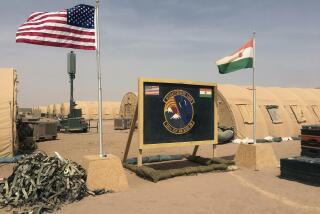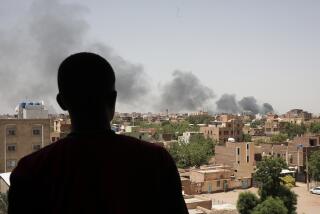Mixed Emotions for Returning Marines : Camp Pendleton: Happy to see loved ones, they speak sadly of strife in Somalia.
- Share via
OCEANSIDE — Marines began returning Tuesday to Camp Pendleton from Somalia, saying they were proud they were able to safely evacuate the United Nations force from that war-torn country but disappointed to leave behind a nation perilously close to anarchy.
“We did what we had to do, but it’s a little rough to leave when so much needs doing,” said Staff Sgt. Stephen Gallegos as he embraced his wife, Phyllis. “It’s real sad over there.”
The 150 Marines who arrived Tuesday were part of the 1st Marine Expeditionary Force, which helped U.N. troops withdraw from Somalia during a tense 73-hour operation last week dubbed Operation United Shield. The rest of the 2,500 Marines will return in April.
Even as the Marines helped U.N. forces retreat to ships, looters swarmed the airport and the capital of Mogadishu and forces loyal to rival warlords began exchanging fire in a desperate struggle for control.
The withdrawal of the multinational force signaled the end of a humanitarian effort begun in 1992 to alleviate widespread starvation and restore order. The food supply has increased markedly but violence among rival clans continues, Mogadishu is in ruins and without electricity, and Somalia lacks a central government.
“The world is exhausted when it comes to Somalia,” said Lt. Gen. Anthony Zinni, who commanded Operation United Shield. “Now it’s up to the Somalis.”
Zinni, who has made six trips to Somalia since 1992, said he is doubtful that a coalition of Somali clan leaders will be able to rule without resorting to fighting.
“I thought it was a very fragile peace while we were there,” said Zinni, who arrived at Camp Pendleton by helicopter from March Air Force Base in Riverside, an hour before troops arrived by bus. “I didn’t hold out a lot of hope.”
Zinni said that the “lesson of Somalia is that the United Nations and others overstretched and were overambitious.” Operation United Shield involved 2,500 American Marines and 500 Italian soldiers who helped extract about 2,400 Pakistani and Bangladeshi troops, the last remnants of the U.N. peacekeeping force.
Without the Marines, Zinni said, the U.N. retreat “could have been very, very serious, possibly bloody.” In 73 hours, he said, Marines engaged in 24 firefights with clan forces who remain armed with high-power weaponry left behind by the Soviets.
“We were pulling out of the airport and the looters were right behind us, shooting every way they could,” Lance Cpl. Shawn Hutzel said.
Sgt. Ruben Pena, whose wife, Maribel, and 18-month-old son, Matthew, came to meet him, said it remains “a big question mark” whether Somalia can survive.
“The whole situation is unfortunate,” said Maj. Leighton Quick, greeted by his wife, Molly, and their 13-month-old son, Ryan. “It’s frustrating that we went over there and fed the people but unfortunately the (Somali) government just wasn’t able to pick it up.”
To Lance Cpl. Nathan Borror, the hasty deployment to Somalia in early January meant missing the birth of his first child, born five days after he left.
Borror’s wife, Cpl. Traci Feder, met him at the bus and, in full glare of several television cameras, handed him their daughter, Samantha. “She’s gorgeous,” said Borror. “It’s great to be back.”
Maj. Paul O’Leary, met by his wife, Bonnie, and sons Kevin, 3, and Patrick, 9, said Somalia “is a very sad place.”
If Somalia descends again into chaos, would O’Leary be willing to return and try to restore order through military force?
“We tried that once,” he said, “and it just didn’t work out.”
More to Read
Sign up for Essential California
The most important California stories and recommendations in your inbox every morning.
You may occasionally receive promotional content from the Los Angeles Times.










